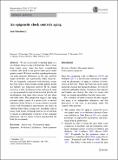An epigenetic clock controls aging
Author(s)
Mitteldorf, Joshua
Download10522_2015_Article_9617.pdf (939.3Kb)
PUBLISHER_POLICY
Publisher Policy
Article is made available in accordance with the publisher's policy and may be subject to US copyright law. Please refer to the publisher's site for terms of use.
Terms of use
Metadata
Show full item recordAbstract
We are accustomed to treating aging as a set of things that go wrong with the body. But for more than twenty years, there has been accumulating evidence that much of the process takes place under genetic control. We have seen that signaling chemistry can make dramatic differences in life span, and that single molecules can significantly affect longevity. We are frequently confronted with puzzling choices the body makes which benefit neither present health nor fertility nor long-term survival. If we permit ourselves a shift of reference frame and regard aging as a programmed biological function like growth and development, then these observations fall into place and make sense. This perspective suggests that aging proceeds under control of a master clock, or several redundant clocks. If this is so, we may learn to reset the clocks with biochemical interventions and make an old body behave like a young body, including repair of many of the modes of damage that we are accustomed to regard as independent symptoms of the senescent phenotype, and for which we have assumed that the body has no remedy.
Date issued
2015-11Department
Massachusetts Institute of Technology. Department of Earth, Atmospheric, and Planetary SciencesJournal
Biogerontology
Publisher
Springer Netherlands
Citation
Mitteldorf, Josh. “An Epigenetic Clock Controls Aging.” Biogerontology 17.1 (2016): 257–265.
Version: Author's final manuscript
ISSN
1389-5729
1573-6768